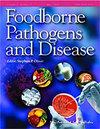植物乳杆菌 F2 的新型生物保护菌株--生理、遗传和抗菌特性分析
IF 1.9
2区 农林科学
Q3 FOOD SCIENCE & TECHNOLOGY
引用次数: 0
摘要
植物乳杆菌(Lactiplantibacillus plantarum)是乳酸菌的一种,它能提高发酵食品的质量,同时对人类健康产生积极影响。本研究对植物乳杆菌 F2 进行了生化和基因鉴定、代谢物产生、抗菌活性和质粒含量等特性研究。该菌株对一些革兰氏阳性和革兰氏阴性病原体(单核细胞增生李斯特菌、金黄色葡萄球菌、沙门氏菌和大肠杆菌)具有抗菌活性,抑菌区直径在 17.0 至 29.0 毫米之间;可发酵葡萄糖、阿拉伯糖、半乳糖、乳糖,并具有在高温(50°C)下生长的能力。该菌株的另一个生理指标是其在选择性培养基--德曼、罗戈沙、夏普培养基(含氯化三苯基四唑的 MRS 培养基)中的形态,在改良 MRS(mMRS)培养基上表现出发色性菌落(特征为紫色菌落)。此外,还使用色谱法研究了菌株 F2 产生的乳酸和双乙酰基等代谢物,发现其含量分别为 10.07 微克/毫升和 0.05 微克/毫升。最后,从菌株 F2 中分离出的质粒被鉴定为植物酵母菌株 KLDS1.0386 质粒 p4,该质粒可能是导致该菌株产生抗菌肽等特性的原因。本文章由计算机程序翻译,如有差异,请以英文原文为准。
A Novel Bioprotective Strain of Lactiplantibacillus plantarum F2-Physiological, Genetical, and Antimicrobial Characterization.
Lactiplantibacillus plantarum is a member of lactic acid bacteria that improves the quality of fermented foods while also having a positive impact on human health. In this study, L. plantarum F2 was studied for characteristics such as biochemical and genetic identification, metabolite production, antimicrobial activity, and plasmid content. This strain exerts antimicrobial activity against some Gram-positive and Gram-negative pathogens (Listeria monocytogenes, Staphylococcus aureus, Salmonella, and Escherichia coli) with inhibition zone diameters ranging between 17.0 and 29.0 mm; it can ferment glucose, arabinose, galactose, lactose, and demonstrated the ability to grow at high temperature (50°C). Another physiological specification of the strain was the morphology of the isolate in selective medium, the de Man, Rogosa, Sharpe medium (MRS medium containing triphenyl tetrazolium chloride), which exhibits a chromogenic colony (characterized as purple colonies) on the modified-MRS (mMRS) medium. Metabolites such as lactic acid and diacetyl production of the strain F2 were also investigated using chromatography and found to be 10.07 and 0.05 µg/mL, respectively. The peptides of the isolate's cell-free supernatant were determined to be ∼80 kDa, and finally, the plasmid isolated from the strain F2 was identified as L. plantarum strain KLDS1.0386 plasmid p4, which may be responsible for some characteristic properties, such as antimicrobial peptide production of the strain.
求助全文
通过发布文献求助,成功后即可免费获取论文全文。
去求助
来源期刊

Foodborne pathogens and disease
医学-食品科技
CiteScore
5.30
自引率
3.60%
发文量
80
审稿时长
1 months
期刊介绍:
Foodborne Pathogens and Disease is one of the most inclusive scientific publications on the many disciplines that contribute to food safety. Spanning an array of issues from "farm-to-fork," the Journal bridges the gap between science and policy to reduce the burden of foodborne illness worldwide.
Foodborne Pathogens and Disease coverage includes:
Agroterrorism
Safety of organically grown and genetically modified foods
Emerging pathogens
Emergence of drug resistance
Methods and technology for rapid and accurate detection
Strategies to destroy or control foodborne pathogens
Novel strategies for the prevention and control of plant and animal diseases that impact food safety
Biosecurity issues and the implications of new regulatory guidelines
Impact of changing lifestyles and consumer demands on food safety.
 求助内容:
求助内容: 应助结果提醒方式:
应助结果提醒方式:


